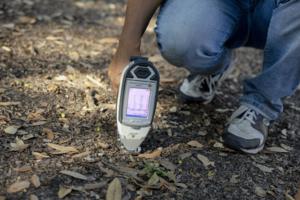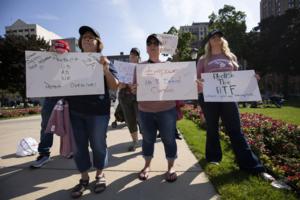Current News
/ArcaMax

KC officials worry: City's new temporary jail 'looks like an ICE detention center'
KANSAS CITY, Mo. — Weeks after Kansas City publicly pushed back against the possibility of turning a local warehouse into a federal Immigration and Customs Enforcement detention center, city officials are looking more critically at their own jail project.
At first glance, some City Council members drew parallels between ICE facilities or ...Read more

Cabello warns Maria Corina Machado of 'surprise' if she returns to Venezuela
Venezuelan Interior Minister Diosdado Cabello issued a thinly veiled threat against opposition leader and Nobel Peace Prize laureate María Corina Machado, warning that authorities have a “surprise” prepared for her if she returns to the country during the upcoming Easter holiday.
Speaking Wednesday on his weekly television program Con el ...Read more

Iran vows to escalate attacks as Trump hails progress in war
The U.S.-Israeli war on Iran waged for a sixth day with little sign of easing, as the Islamic Republic vowed to intensify its retaliation and oil extended gains.
Arab states across the Middle East — as well as Israel — reported interceptions of Iranian missiles and drones on Thursday, with Qatar telling residents to remain indoors due to ...Read more
Ukraine says peace talks with Russia on hold due to Iran war
U.S.-brokered peace talks between Kyiv and Moscow initially planned for this week are postponed indefinitely due to the war in Iran, according to Ukrainian President Volodymyr Zelenskyy.
“For now, because of the situation with Iran, the necessary signals for a trilateral meeting haven’t come yet,” Zelenskyy said in his regular address to ...Read more

Strait of Hormuz escorts risk triggering Iran anti-ship missiles
President Donald Trump’s suggestion that the U.S. would insure and protect oil tankers and other vessels passing through the Strait of Hormuz may potentially bring Iran’s anti—ship missiles into play, adding a new dimension to a conflict largely defined by air power.
Iran is known to have at least six types of such missiles, according to ...Read more

Florida Legislature won't pass vaccine exemption bill this session
TALLAHASSEE, Fla. — Florida’s Legislature won’t change the state‘s vaccine laws this session.
Although the Florida Senate is set to pass legislation that would make it easier to opt out of vaccines that are required for school, House Speaker Daniel Perez on Wednesday confirmed the bill would not move forward in his chamber.
“That’s...Read more

Iran vows to escalate attacks as Trump hails progress in war
The U.S.-Israeli war on Iran entered a sixth day with little sign of easing, as the Islamic Republic vowed to intensify its retaliation and oil extended gains.
Arab states across the Middle East — as well as Israel — reported interceptions of Iranian missiles and drones into Thursday, with Qatar telling residents to remain indoors due to ...Read more

Outer Banks erosion reveals buried whale, NC group says. 'Stinks to high heaven'
Worsening beach erosion on North Carolina’s Outer Banks is now being blamed for something down right creepy: Digging up a dead whale, according to coastal community leaders.
It’s happening in Corolla and the Corolla Civic Association says the grave is being repeatedly uncovered and recovered at the whims of the tide.
“Approximately four ...Read more

Families defend disability services amid Medicaid cuts
Families of Idahoans with disabilities say their lives could be upended as lawmakers in the state’s Republican-dominated legislature mull sweeping cuts.
Services at risk include the 24/7 care that allows a 39-year-old with cerebral palsy to live independently; the in-home caregiving that lets a 26-year-old with brain damage from a hemorrhage ...Read more

States try 'public option' Obamacare plans to reduce coverage costs
Nearly two decades ago, progressives fought to include a so-called public option — a government-run health plan — in the broad health care overhaul known as Obamacare. That effort failed, defeated by heavy lobbying from the insurance industry and opponents who decried it as a government takeover of health care.
But the final Affordable Care...Read more

Federal aid for lead cleanup is receding. That's a problem for cash-strapped cities
Tighter regulations and an influx of federal money in recent years have helped communities across the U.S. initiate efforts to clean up lead contamination in soil, drinking water, and older homes. But Congress and the Trump administration have partially rolled back those rules and resources, potentially making it more challenging for cash-...Read more

Ex-Illinois inmate's lawsuit over forced labor induction tests Gov. JB Pritzker on reproductive rights
EAST ALTON, Ill. — She arrived at X House resigned to delivering her baby while incarcerated.
Amy Hicks was 7 ½ months pregnant and convicted of an illegal drug offense that would keep her behind bars for months to come. Still, as Hicks waited inside that transitional cellblock of the Logan Correctional Center women’s prison, she thought ...Read more

Florida taxpayers likely on the hook for Alligator Alcatraz
TALLAHASSEE, Fla. — Gov. Ron DeSantis proclaimed on social media in early October that the federal government had awarded the state $608 million to help recoup the cost of building Alligator Alcatraz.
“We were right; media was wrong,” he wrote, targeting earlier media reports that questioned whether the federal government would pony up.
...Read more

GOP says Kentucky Gov. Andy Beshear supports surgery for trans kids. What does his record show?
LEXINGTON, Ky. — When Democratic Gov. Andy Beshear ran for reelection in 2023, a reoccurring Republican line of attack was that he’d allow minors to undergo gender-affirming surgeries.
Now, as the governor builds his national name ID ahead of a potential 2028 presidential run, Republicans in Kentucky and beyond are re-upping that line of ...Read more

Volunteer is archiving Renee Good memorial site artifacts
MINNEAPOLIS — Ryan Vizzions started collecting posters from the spontaneous public memorial that sprung up at the site of Renee Good’s killing. The traveling photographer appointed himself the site’s caretaker.
He also gathered many other items — a cookie jar filled with handwritten letters rolled into scrolls, letters addressed to Good...Read more

Sen. Steve Daines of Montana announces surprise retirement
WASHINGTON — Montana Republican Steve Daines withdrew his Senate reelection paperwork Wednesday minutes before the deadline — and minutes after U.S. attorney Kurt Alme filed to run for the seat himself.
Daines’ decision appeared to catch most of Washington off guard, but he said he had been pondering it for some time.
“Serving the ...Read more

Minneapolis council members press chief on why police didn't do more during ICE surge
Several members of the Minneapolis City Council pressed Police Chief Brian O’Hara Wednesday on why police didn’t do more about the conduct of federal agents during the 12-week federal immigration surge.
The questions from the more-progressive council members came a day after Hennepin County Attorney Mary Moriarty suggested police officers ...Read more

What constitutional carry would mean for Michigan gun owners
A group of Republican lawmakers wants to get rid of Michigan's law requiring residents to have a permit to carry a concealed pistol.
Legislation introduced this week in the GOP-controlled Michigan House would repeal the state's concealed pistol permit law, allowing residents to carry a handgun without any identification that they're permitted ...Read more

Military jets scrambled over false bomb threat on Newark flight
WASHINGTON — U.S. and Canadian military aircraft were sent to the skies in response to an ultimately unfounded security threat on a Scandinavian Airlines flight bound for Newark Liberty International Airport.
The military planes “monitored the airliner from a distance as it passed through Canadian and United States airspace” before the ...Read more

California mother convicted in alcohol-fueled teen party case involving sexual assaults
SAN JOSE, Calif. — A former Los Gatos mother accused of organizing alcohol-fueled teen parties that prosecutors said led to dangerous binge drinking and sexual assaults was found guilty Wednesday of 48 crimes encompassing child endangerment and sex offenses.
After a three-month trial, jurors convicted 51-year-old Shannon O’Connor of ...Read more
Popular Stories
- Outer Banks erosion reveals buried whale, NC group says. 'Stinks to high heaven'
- Ex-Illinois inmate's lawsuit over forced labor induction tests Gov. JB Pritzker on reproductive rights
- States try 'public option' Obamacare plans to reduce coverage costs
- Florida taxpayers likely on the hook for Alligator Alcatraz
- Families defend disability services amid Medicaid cuts





